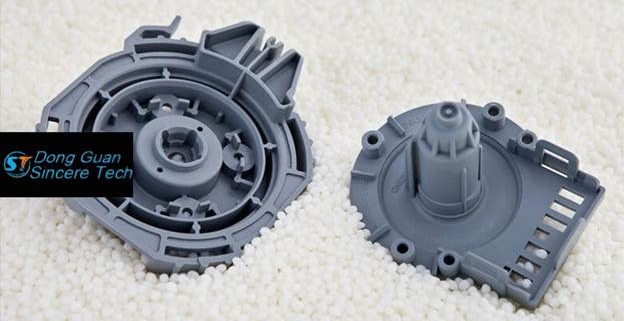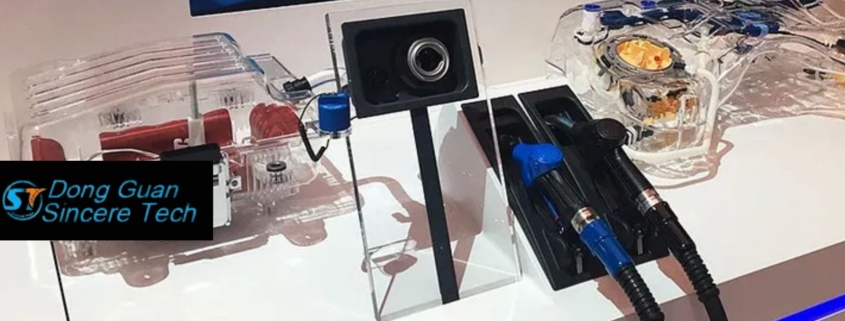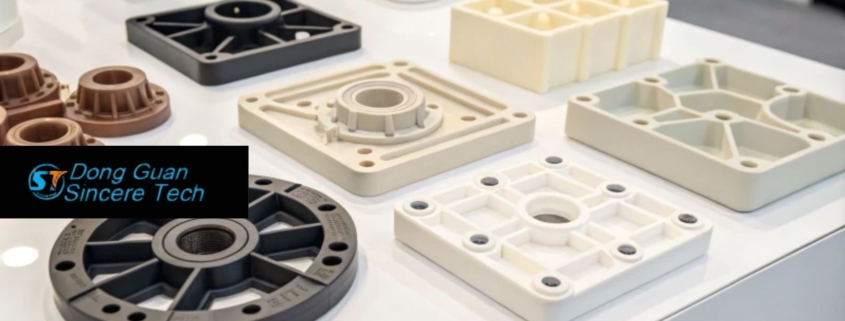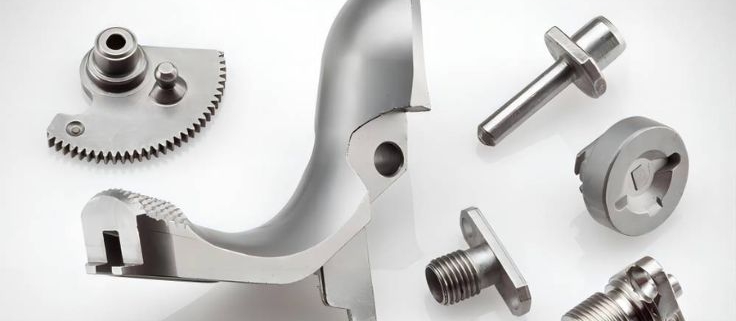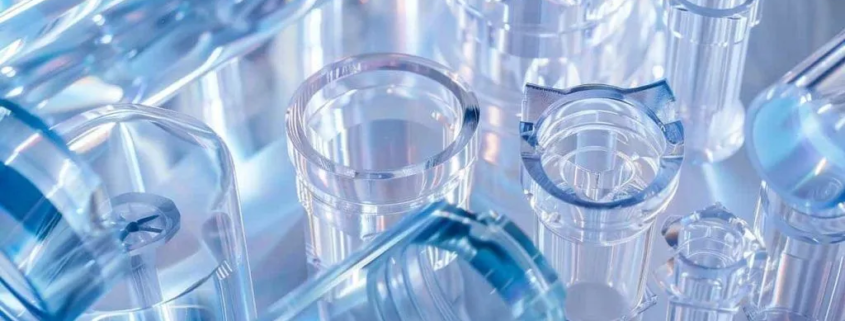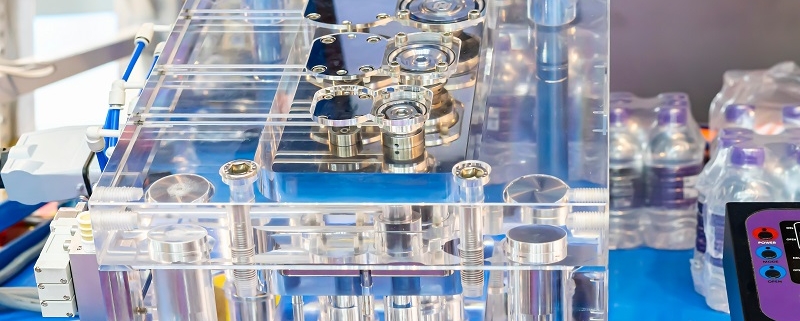Produksjon av sprøytestøpte deler er en viktig del av den moderne industrien. Sprøytestøping brukes til å lage mange av produktene som omgir oss. Dette er en prosess som hjelper til med å produsere sterke og nøyaktige komponenter. Dette er komponenter som finner sine anvendelser innen mange felt. Kvaliteten på støpte produkter som etterspørres øker årlig.
Årsaken til den utstrakte bruken av sprøytestøpte plastdeler er at de er holdbare og økonomiske. De gjør det mulig for bedrifter å produsere et stort antall produkter som har samme form. Komplekse design fungerer også bra i denne prosessen. I mellomtiden er sprøytestøpeformdelene viktige i formingen og formingen av disse produktene. Prosessen kan ikke gå bra uten de riktige formkomponentene.
Populariteten til sprøytestøping skyldes at det er tidsbesparende. Det reduserer også avfallet. Metoden gjør det mulig å produsere i korte sykluser. Det er noe en rekke bransjer ikke har råd til å avstå fra.
Sprøytestøping av plast: Hva er sprøytestøping av plast?
Plast sprøytestøping refererer til en produksjonsprosess. Ved hjelp av den produseres plastprodukter i store mengder. Det er også en rask og pålitelig prosedyre. Den kan brukes til å produsere deler med samme form og størrelse i alle tilfeller.
I denne prosessen varmes plastmaterialet først opp. Plasten blir myk og smelter. Den flytende plasten settes deretter inn i en form. Formen har en bestemt form. Når plasten kjøles ned, blir den fast. Hele denne delen fjernes fra formen.

Plastsprøytestøping brukes til å lage enkle og komplekse produkter. Det gir høy nøyaktighet. Det reduserer også materialsløsing. Årsaken har å gjøre med det faktum at det er populært fordi mindre tid og penger går til spille.
Tabell 1: Komponenter i sprøytestøpeformen
| Formkomponent | Typisk materiale | Toleranse | Overflatebehandling | Typisk livssyklus | Funksjon |
| Kjerne og hulrom | Herdet stål/aluminium | ±0,01-0,03 mm | Ra 0,2-0,8 μm | >1 million skudd | Former interne og eksterne funksjoner |
| Løper | Stål / Aluminium | ±0,02 mm | Ra 0,4-0,6 μm | >500 000 skudd | Kanaliserer smeltet plast til hulrommet |
| Porten | Stål / Aluminium | ±0,01 mm | Ra 0,2-0,5 μm | >500 000 skudd | Kontrollerer at plast kommer inn i hulrommet |
| Kjølekanaler | Kobber / Stål | ±0,05 mm | Ra 0,4-0,6 μm | Kontinuerlig | Fjerner varmen effektivt |
| Utkasterpinner | Herdet stål | ±0,005 mm | Ra 0,3-0,5 μm | >1 million skudd | Skyver ut den ferdige delen uten å skade den |
| Ventilasjonsspor | Stål / Aluminium | ±0,01 mm | Ra 0,2-0,4 μm | Kontinuerlig | Frigjør innestengt luft under injeksjon |
Kjennskap til sprøytestøpingsprosessen
En kontrollert og presis produksjonsmetode er sprøytestøpingsteknologien. De brukes i produksjonen av plastkomponenter med høy nøyaktighet. Det er en funksjonell prosedyre som skjer i trinn. Hvert trinn har noen parametere og numeriske verdier.
Utvalg og klargjøring av materialer
Det begynner med plastråstoff. Dette pakkes vanligvis i form av pellets eller i form av granulat. Slike materialer er normalt ABS, polypropylen, polyetylen og nylon.
- Pelletsstørrelse: 2-5 mm
- Våtinnhold før tørking: 0.02% -0.05%
- Tørketemperatur: 80 °C-120 °C
- Tørketid: 2-4 timer
Riktig tørking er avgjørende. Bobler og overflatedefekter på støpte deler kan oppstå på grunn av fuktighet.
Smelting og plastifisering
Plastpelletsene tørkes og presses inn i sprøytestøping maskin. De går gjennom en skrue som roterer og gjennom et varmt fat.
- Soner for tønnetemperatur: 180 °C-300 °C
- Skruehastighet: 50-300 O/MIN
- Skruekompresjonsforhold: 2.5:1 -3.5:1.
Plasten smeltes ved å vri på skruen. Stoffet blir til en homogen masse av væske. Selv smeltingen gir konsistens av komponenten.
Injeksjonsfasen
Når plasten er ferdig smeltet, skyves den inn i støpeformens hulrom. Formen fylles med stort trykk på en rask og regulert måte.
- Injeksjonstrykk: 800-2000 bar
- Injeksjonshastighet: 50-300 mm/s
- Injeksjonstid: 0,5-5 sekunder
Det er ingen bruk av korte skudd og blits på grunn av riktig trykkregulering. Det er meningen at hele formen skal fylles før avkjølingen av plasten begynner.
Pakke- og oppbevaringsfasen
Formen fylles, og det påføres trykk på formen. Dette er for å overvinne prosessen med materialkrymping ved romtemperatur.
- Lastetrykk: 30-70 prosent av injeksjonsstrømmen.
- Holdetid: 5-30 sekunder
- Typisk krympingshastighet: 0,5%-2,0%
Denne prosessen øker delens konsentrasjon og dimensjon. Den reduserer også innvendige stenter.
Kjøleprosessen
Sprøytestøping er den prosessen som tar lengst tid å kjøle ned. Deretter størkner og smelter plastmaterialet.
- Formtemperatur: 20 °C-80 °C
- Avkjølingstid: 10-60 sekunder
- Effektivitet ved varmeoverføring: 60%-80%
Eliminering av varme gjøres ved hjelp av kjølekanaler i formen. Riktig avkjøling eliminerer skjevheter og defekter i overflaten.
Formåpning og utstøping
Etter avkjøling åpnes formen. En ferdig utstøpt seksjon fjernes ved hjelp av utstøtingspinner eller -plater.
- Formens åpningshastighet: 50-200 mm/s
- Utskyterkraft: 5-50 kN
- Utskytingstid: 1-5 sekunder
Utstøting: Forsiktig utstøting vil ikke skade delene. Når formen lukkes, starter neste syklus.
Syklustid og produksjonsproduksjon
Den totale syklustiden vil variere avhengig av størrelsen på delene og materialet.
- Gjennomsnittlig syklustid: 20-90 sekunder
- Utgangshastighet: 40 -180 deler/time.
- Maskinens klemkraft: 50-4000 tonn
Reduserte syklustider vil øke produktiviteten. Kvaliteten må imidlertid opprettholdes hele tiden.
Overvåking og kontroll av prosessen
I moderne maskiner brukes sensorer og automatisering. Disse systemene kontrollerer trykk, strømningshastighet og temperatur.
- Temperaturtoleranse: ±1°C
- Trykktoleranse: ±5 bar
- Dimensjonell nøyaktighet: ±0,02 mm
Overvåking av prosessen sikrer jevn kvalitet. Det reduserer også skraping og nedetid.
Betydningen av komponenter i mugg
Sprøytestøping er avhengig av formens deler. Hvert av elementene i formen har en viss rolle å spille. Disse er forming, kjøling og utstøping.
Den sprøytestøping av plast deler anses å være vellykkede avhengig av riktig utforming av formen. En dårlig form kan forårsake defekter. Disse feilene inkluderer sprekker og ubalanserte overflater. Formdeler laget av sprøytestøping, derimot, hjelper til med å sikre nøyaktighet. De sørger også for at de går i gode sykluser.
Det støpes protraktdeler av høy kvalitet. De reduserer også vedlikeholdskostnadene. Dette gjør den mer effektiv og pålitelig.
Teknisk informasjon om formkomponenter
Formkomponentene er de viktigste elementene i sprøytestøpesystemet. De styrer formen, nøyaktigheten, styrken og kvaliteten på overflaten. Uten godt utformede formkomponenter er det umulig å oppnå en stabil produksjon.

Kjerne og hulrom
Kjernen og hulrommet er det som bestemmer produktets endelige form. Den ytre overflaten består av hulrommet. Kjernen utgjør de indre funksjonene.
- Dimensjonell toleranse: ±0,01-0,03 mm
- Overflatebehandling: Ra 0,2-0,8 µm
- Typisk stålhardhet: 48-62 HRC
Presisjonen i kjernen og hulrommet er høy, noe som minimerer antall defekter. Det forbedrer også ensartetheten til delene.
Runner System
Kanalsystemet leder den smeltede plasten fra innsprøytningsdysen til hulrommet. Det påvirker strømningsbalansen og fyllingshastigheten.
- Løperdiameter: 2-8 mm
- Strømningshastighet: 0,2-1,0 m/s
- Grenser for trykktap: ≤10%
Reduksjon av materialavfall gjøres ved riktig utforming av løperen. Den har også en jevn fylling.
Gate Design
Porten regulerer plaststrømmen i hulrommet. Kvaliteten på emnet avhenger av størrelsen og typen port.
- Porttykkelse: 50 -80 av delens tykkelse.
- Portbredde: 1-6 mm
- Grensen for skjærhastighet: <100,000 s-¹
Utformingen med høyreport eliminerer sveiselinjer og brennmerker.
Kjølesystem
Kjølespor brukes til å kjøle ned støpeformen. Dette systemet har direkte innvirkning på syklustiden og stabiliteten til delene.
- Kjølekanalens diameter: 6-12 mm
- Kanalens avstand til hulrommet: 10-15 mm.
- Maksimal tillatt temperaturforskjell: < 5 °C.
Enkel kjøling forbedrer dimensjonsnøyaktigheten. Det reduserer også produksjonstiden.
Utstøtingssystem
Når delen er avkjølt, skytes den ut i utstøtingssystemet. Den må utøve like mye kraft for å forhindre skade.
- Diameter på utkasterbolten: 2-10 mm
- Utkasterkraft per stift: 200-1500 N
- Utstøtingsslaglengde: 5-50 mm
Jevn utstøting eliminerer sprekker og deformasjoner.
Ventilasjonssystem
Luften kan fanges opp og slippe ut gjennom ventilasjonsåpningene når du injiserer. Brannskader og ufullstendig fylling forårsakes av dårlig utlufting.
- Ventilasjonsdybde: 0,02-0,05 mm
- Ventilasjonsbredde: 3-6 mm
- Maksimalt lufttrykk: <0,1 MPa
Tilstrekkelig utlufting forbedrer kvaliteten på overflatene og levetiden til muggsoppene.
Base og justeringskomponenter Mold Base
Bunnen av formen bærer alle delene. For å sikre riktig innretting brukes det foringer og styrepinner.
- Toleranse for styrepinne: ±0,005 mm
- Støpeformens flathet: ≤0,02 mm
- Tilpasning til livssyklusen: mer enn 1 million skudd.
Høy innretting reduserer slitasje og blits.
Tabell 2: Viktige prosessparametere
| Parameter | Anbefalt rekkevidde | Enhet | Beskrivelse | Typisk verdi | Merknader |
| Tønnetemperatur | 180-300 | °C | Varme påføres for å smelte plasten | 220-260 | Avhenger av materialtypen |
| Injeksjonstrykk | 800-2000 | bar | Trykk for å presse smeltet plast inn i formen | 1000 | Juster for delstørrelse og kompleksitet |
| Formtemperatur | 20-120 | °C | Temperaturen opprettholdes for riktig kjøling | 60-90 | Høyere for teknisk plast |
| Avkjølingstid | 10-60 | sekunder | På tide at plasten stivner | 25-35 | Avhenger av veggtykkelse |
| Syklustid | 20-90 | sekunder | Total tid per støpesyklus | 30-50 | Inkluderer injeksjon, pakking og kjøling |
| Utkasterkraft | 5-50 | kN | Kraft til å fjerne delen fra støpeformen | 15-30 | Må forhindre skade på deler |
Råmaterialer Sprøytestøping
Materialvalg er svært viktig. Det påvirker kvaliteten, stabiliteten, utsikten og prisen på sluttproduktet. Å velge riktig plast er nødvendig for å garantere at delene fungerer og blir skrevet ut på riktig måte.

Termoplastiske materialer
De mest utbredte materialene er termoplast på grunn av at de kan smeltes og gjenbrukes flere ganger. ABS, polypropylen, polyetylen og polystyren brukes i stor utstrekning. ABS er slagfast og sterkt, og smelter ved 200 til 240 °C. Polypropylen smelter ved 160 °C eller 170 °C, er lett i vekt og motstandsdyktig mot kjemikalier. Polyetylen har et smeltepunkt på 120 °C til 180 °C og egner seg godt i fuktbestandige produkter.
Teknisk plast
Deler med høy styrke eller varmebestandige deler lages med tekniske plaster som nylon, polykarbonat (PC) og POM. Nylon smelter ved 220 °C-265 °C og brukes i tannhjul og mekaniske deler. Polykarbonat er en sterk og gjennomsiktig polymer som smelter ved 260 °C til 300 °C. POM har en smeltetemperatur på 165 °C til 175 °C og brukes i komponenter.
Herdeplast
Herdeplast er vanskelig å smelte om etter at den er støpt, fordi den herder permanent. De smelter ved 150 °C-200 °C og brukes i høytemperaturapplikasjoner som for eksempel elektriske komponenter.
Tilsetningsstoffer og fyllstoffer
Materialene forbedres av tilsetningsstoffer. Glassfibre (10% -40 prosent) gir økt styrke, mineralfyllstoffer (5%-30 prosent) reduserer krymping, og UV-stabilisator (0,1-1 prosent) beskytter mot solen. Disse hjelpekomponentene har lengre levetid og fungerer bedre.
Krav til materialvalg
Materialvalget er faktordrevet når det gjelder temperatur, styrke, kjemisk konfrontasjon, fuktighet og kostnad. Et riktig valg vil resultere i langvarige, presise kvalitetsprodukter med høy holdbarhet, og det vil redusere feil og sløsing.
Tabell 3: Materialegenskaper
| Materiale | Smeltetemperatur (°C) | Formtemperatur (°C) | Injeksjonstrykk (bar) | Strekkfasthet (MPa) | Krymping (%) |
| ABS | 220-240 | 60-80 | 900-1500 | 40-50 | 0.5-0.7 |
| Polypropylen (PP) | 160-170 | 40-70 | 800-1200 | 30-35 | 1.0-1.5 |
| Polyetylen (PE) | 120-180 | 20-50 | 700-1200 | 20-30 | 1.5-2.0 |
| Polystyren (PS) | 180-240 | 50-70 | 800-1200 | 30-45 | 0.5-1.0 |
| Nylon (PA) | 220-265 | 80-100 | 1200-2000 | 60-80 | 1.5-2.0 |
| Polykarbonat (PC) | 260-300 | 90-120 | 1300-2000 | 60-70 | 0.5-1.0 |
| POM (Acetal) | 165-175 | 60-80 | 900-1500 | 60-70 | 1.0-1.5 |
Komponenter som produseres ved hjelp av plastsprøytestøpingsprosessen
Plastsprøytestøping er en prosess som skaper et stort antall komponenter som kan brukes i ulike sektorer. Prosessen er presis, holdbar og kan produseres i store volumer. Nedenfor ser du eksempler på typiske komponenter som produseres på denne måten.

Bildeler
- Dashbord
- Støtfangere
- Luftventiler
- Dørpaneler
- Girspaksknotter
- Komponenter i drivstoffsystemet
- Interiørlister
Medisinske deler
- Sprøyter
- Slangekoblinger
- Kirurgiske instrumenter
- IV-komponenter
- Hus for medisinsk utstyr
- Medisinsk engangsutstyr
Elektronikkdeler
- Kapslinger for enheter
- Brytere og knapper
- Kabelklemmer og ledningsholdere
- Kontakter og støpsler
- Tastaturtaster
- Kretskortkapslinger
Emballasjeprodukter
- Flasker og krukker
- Flaskekapsler og korker
- Beholdere til mat
- Beholdere til kosmetikk
- Lokk og forseglinger
- Oppbevaringsbokser
Forbruks- og industrivarer
- Leker og figurer
- Husholdningsverktøy
- Apparatets komponenter
- Konstruksjonsbeslag
- Nøyaktige klips og festeanordninger.
- Industrielle maskindeler
Design og presisjon
Design er en viktig bidragsyter til suksess. En effektiv form forbedrer kvaliteten på et produkt. Det minimerer også feil under produksjonen.
Delene av prosessen med sprøytestøping av plast krever strenge dimensjoner. Ytelsen kan påvirkes av små feil. Dette er grunnen til at utformingen av sprøytestøpeformdelene er designet med tette toleranser. Moderne programvare brukes ofte i designfasen.

Styrken forsterkes også gjennom god design. Det forbedrer utseendet. Det garanterer overlegen passform i sluttmonteringer.
Industrielle bruksområder
Mange bransjer bruker også sprøytestøping, som er raskt, nøyaktig og økonomisk. Det muliggjør masseproduksjon av identiske deler med svært høy presisjon.
Bilindustrien
I bilsektoren lages dashbord, støtfangere, luftventiler og innvendige paneler ved hjelp av sprøytestøping av plastdeler. Disse komponentene skal være kraftige, lette og varmebestandige. Spesielt gjøres det ved støping, hvorved formene er nøyaktige og ensartede for å forhindre sikkerhets- og kvalitetsproblemer.
Medisinsk industri
I medisin sprøyter, slangekoblinger og kirurgiske instrumenter fremstilles ved hjelp av sprøytestøping. Det er behov for mye presisjon og hygieneområder. Spesielt kan sprøytestøpedeler av plast være laget av plast av medisinsk kvalitet, og sprøytestøpeformdeler kan brukes for å sikre nøyaktighet og glatthet.
Elektronikkbransjen
I elektronikkindustrien produseres hus, kontakter, brytere og kabelklemmer ved hjelp av sprøytestøping. Sprøytestøpedeler av plast sikrer de skjøre kretsene, og sprøytestøpeformdelene er nødvendige for å få delene til å passe perfekt.
Emballasjeindustrien
Sprøytestøping brukes også til emballering av flasker, beholdere, hetter og lokk. Delene av plastsprøytestøping brukes til å gi de nødvendige formene og størrelsene, mens delene av sprøytestøping brukes til å produsere i store mengder på kortest mulig tid ved å skape minimalt svinn.
Andre bransjer
Forbruksvarer, leker, bygg og anlegg og romfart blir også sprøytet. Fleksibiliteten og nøyaktigheten gjør at den kan tilpasses nesten alle plastprodukter, fra enkle husholdningsartikler til kompliserte tekniske deler.
Kvalitetskontroll og testing
I produksjonen er det nødvendig med kvalitetskontroll. Alle delene skal tørkes ut for å oppfylle designkravene. Testing er et mål på sikkerhet og ytelse.
De sprøytestøpte plastdelene gjennomgår visuelle og mekaniske inspeksjoner. Gjennom disse kontrollene oppdages feil på et tidlig stadium. Samtidig utføres inspeksjon av slitasje og skader på sprøytestøpeformdelene. Hyppige inspeksjoner eliminerer produksjonsfeil.
God kvalitetsstyring øker kundenes tillit. Det minimerer også svinn og utgifter.
Fordeler med sprøytestøping
Det er mange fordeler med sprøytestøping. Det tillater en rask produksjonshastighet. Det garanterer også repetisjon.
Sprøytestøping av plast delene er dynamiske og lette. De er i stand til masseproduksjon. Samtidig støttes automatiseringen av sprøytestøping av formdelene. Dette reduserer arbeidskostnadene og feilene.

Dessuten er prosessen miljøvennlig. Skrapmaterialet kan gjenbrukes. Dette vil bidra til å redusere miljøbelastningen.
Utfordringer og løsninger
Sprøytestøping, akkurat som alle andre prosesser, byr på utfordringer. Det er både materialproblemer og slitasje på formene. Ugunstige omgivelser fører til feil.
Det kan oppstå feil på deler som ikke håndteres på riktig måte ved sprøytestøping av plastdeler. Disse risikoene kan minimeres ved hjelp av riktig opplæring. Samtidig må formdeler som brukes i sprøytestøping, vedlikeholdes regelmessig. Dette sikrer lang levetid.
Moderne teknologi vil være nyttig for å løse mange problemer. Effektiviteten økes gjennom automatisering og overvåking.
Fremtiden for sprøytestøping
Fremtiden for sprøytestøping er solid. Det skjer en utvikling av nye materialer. Smart produksjon er i ferd med å bli en realitet.
Sprøytestøpte deler som produseres av plast vil bli forbedret. De vil bli mer betydningsfulle og lettere. Samtidig vil bedre materialer og belegg bli brukt på sprøytestøpte deler. Dette vil øke levetiden.
Bransjen vil fortsatt være preget av innovasjon. Konkurransedyktige bedrifter vil være de som endrer seg.
Kinas rolle
Kina bidrar betydelig til markedet for sprøytestøping i verden. Landet er blant de største produsentene av sprøytestøpedeler av plast og distributør av sprøytestøpeformdeler. Produksjonssektoren er svært diversifisert i landet; småskalaproduksjon er tilgjengelig så vel som industriproduksjon i store volumer.

Fabrikkene i Kina har maskiner med høy presisjon og faglært arbeidskraft som brukes til å produsere deler. Mange internasjonale selskaper er avhengige av kinesiske produsenter fordi de tilbyr kostnadseffektive løsninger uten å gå på bekostning av kvaliteten.
Dessuten er Kina ledende innen innovasjon. Landet skaper nye materialer, støpeformer og automatiseringsmetoder for å øke effektiviteten. Landet har en god forsyningskjede og høy produksjonskapasitet, noe som bidrar til statusen som en viktig aktør når det gjelder å tilfredsstille den globale etterspørselen etter sprøytestøpte produkter.
Hvorfor velge Sincere Tech
Vi er Sincere Tech, og vi arbeider med å levere høykvalitets plastsprøytestøpedeler og sprøytestøpeformdeler til våre kunder i forskjellige bransjer. Vi har mange års erfaring og en lidenskap for å gjøre ting på den beste måten, og derfor er alle produktene våre av beste kvalitet når det gjelder presisjon, holdbarhet og ytelse.
Vi har en gruppe erfarne og kvalifiserte ingeniører og teknikere som tilbyr kvalitet og rimelige løsninger gjennom bruk av moderne maskiner og nye metoder. Vi har lagt stor vekt på alle detaljer, som valg av materiale, utforming av støpeformer osv., slik at vi har samme kvalitet i hvert parti.
Kundene foretrekker Sincere Tech fordi vi setter pris på tillit, profesjonalitet og kundetilfredshet. Vi samarbeider med hver enkelt kunde for å bli kjent med deres spesielle behov og tilby løsninger som dekker deres behov. Vi har også forpliktet oss til å levere til rett tid, gi teknisk assistanse og kontinuerlig forbedring, noe som gjør at vi skiller oss ut i sprøytestøpeindustrien.
Sincere Tech er selskapet der du kan finne ekspertise innen sprøytestøping av plast når du trenger enten mindre, detaljerte deler eller produksjon av store volumer. Hos oss får du ikke bare deler, du får også et team som er dedikert til din suksess og vekst.
Hvis du vil vite mer om tjenestene og produktene våre, kan du gå til plas.co og se hvorfor vi er det riktige valget for kunder over hele verden.
Konklusjon
Sprøytestøping er en solid produksjonsprosess. Det er ryggraden i mange bransjer i verden. Dens viktigste styrker er presisjon, hastighet og kvalitet.
Plastsprøytestøpedeler er fortsatt veldig viktige i hverdagen. De er nyttige for å betjene forskjellige behov, fra de enkleste til de komplekse komponentene. I mellomtiden garanterer sprøytestøping av formdeler den effektive produksjonsflyten og det samme resultatet.
Sprøytestøping vil bare fortsette å øke med riktig design og vedlikehold. Det vil også fortsette å være en viktig del av moderne produksjon.

